Food & Drink
Equality Eats Here — Peachy Corners Café
Published
4 years agoon

Tucked away in the Spalding Center complex on Spalding Drive, the charming front patio decked out with string lights welcomes you to Peachy Corners Cafe. The menu features favorites like espresso drinks, drip coffee, tea and pastries, and also includes a variety of bubble tea and smoothies. Mellow music lends the space a relaxed vibe, while a chalk wall covered in doodles and rolling cart stacked high with board games suggests the kid-friendly fun that takes place here.
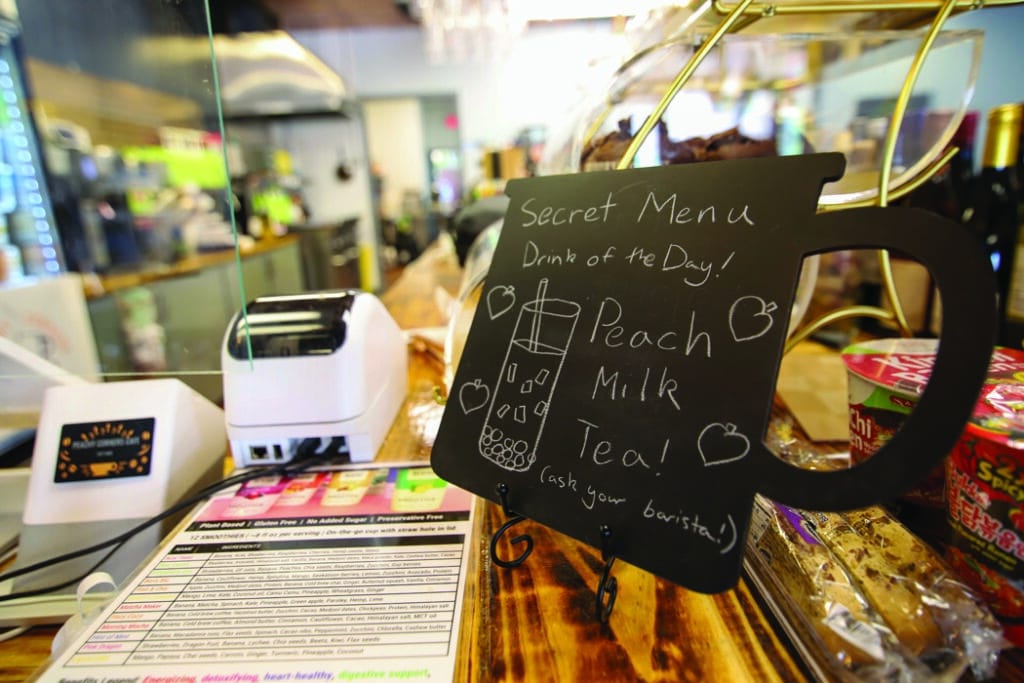
Owner Long Tran opened Peachy Corners Cafe with his wife Susie Martono-Tran in January of 2020. “My wife has always wanted to open a bubble tea shop since I met her,” explained Long, who was inspired to open a cafe when he struggled to find good local coffee during his sons’ karate lessons across the street. “We decided to merge the two and sell really good coffee and really good bubble tea and thought that could work. There’s something to it because we are still here, despite the pandemic.”
Trial by fire
2020 was quite a challenging time to open a coffee shop. “We had no idea,” said Long, shaking his head at the memory. Peachy Corners Cafe was among the first restaurants in the area to shut their doors as the information they received from their friends and loved ones who live in other countries gave them advance notice as to the severity of COVID-19 and what to expect. From mid-March to early June the doors at the cafe remained closed and their fledgling business could have been in serious trouble. Fortunately, they had an idea that allowed them to stay afloat during those early days of the pandemic.
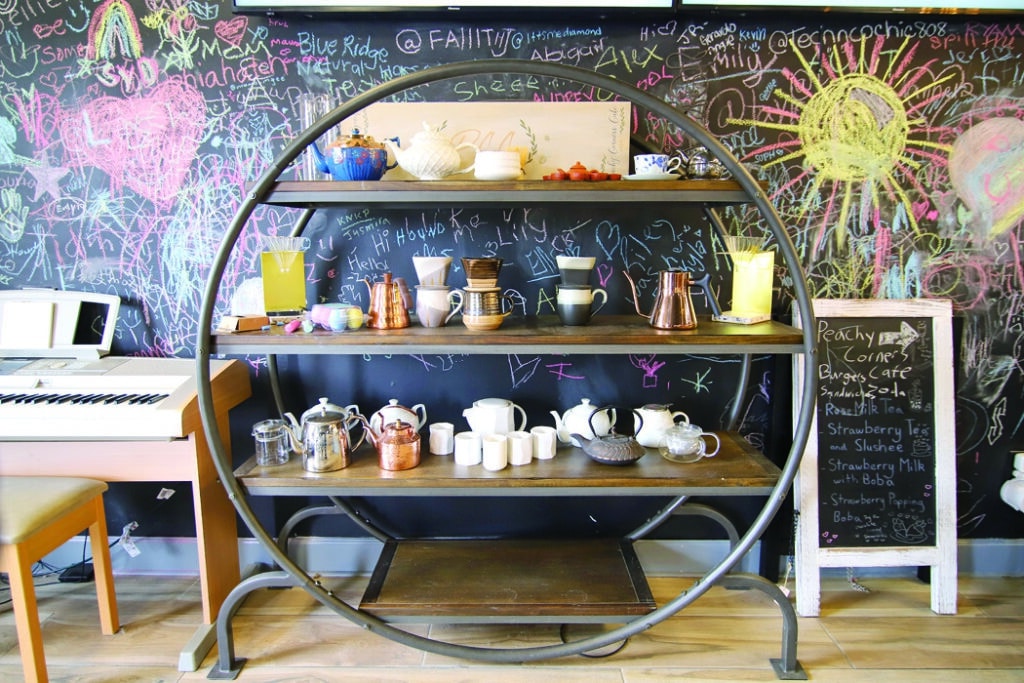
They began making drinks to donate to healthcare professionals and first responders, and quickly word got out about these charitable acts. The community responded positively, with many regular customers stepping up to donate funds that allowed Peachy Corners Cafe to give back to those on the front line, find a use for their perishables so they would not go to waste and operate in such a way that they did not lose money on the products they already had on hand before the shutdowns. “We didn’t make money off the donations, but it kept us from losing money as well,” explained Long. “I think that was very crucial to us, and it also became a way for us to continue engaging with the community and get our name out there as a new business.”
It was important to Long to take precautionary action in response to COVID-19. Not only did he want to keep his family safe, he also wanted to ensure that he had the necessary supplies like hand sanitizer, plexiglass dividers and upgraded filters for the cafe’s HVAC system which would ensure his staff and customers would also be safe when they eventually reopened

.Their efforts seem to have paid off. None of the staff has gotten sick, and these days the customers have started coming in again. “By the end of July, we saw business slowly return, and now I think we are starting to get a sense for the potential of what this space might be.” Peachy Corners Cafe has a loyal following and Long knows many of the regulars by name. Popular among working professionals during the day, there are also a lot of families and kids that frequent the cafe after school.
No space for hate
Since the beginning of the pandemic, there have been those who have blamed Asian countries for the origin and spread of the COVID-19 virus. When those views were expressed in the media, the idea quickly took hold and Long witnessed a variety of responses from microaggressions and boycotting all the way to outright intimidation and violence.
“Atlanta has got this great community and great sense of community, but recently it seems there has been a rise in resentment,” said Long. “With rhetoric from our elected leaders, regardless of which political side they are on, when you are trying to score political points by going after North Korea or China, you can inadvertently paint targets on the backs of your Asian American citizens.”
Locally, the response to these ideas has been largely passive-aggressive rather than outright aggressive, unlike the hate crimes frequently taking place in cities like San Francisco and New York where Asian Americans are literally being attacked on the streets without provocation.
Throughout the pandemic, and amplified over the last four years, the rise in racism and hate crimes has set the stage for prejudice, hatred and fear. Armed protestors took to the streets of Chinatown in Chamblee last summer, telling Chinese business owners and citizens that they were not welcome.
Businesses on Buford Highway are receiving hateful phone calls or prank calls — and some have even had rocks thrown through their windows. Last spring ‘Wuhan plague’ plaques began popping up on signs and businesses throughout the city that depicted Winnie The Pooh eating a bat. These incidents represent a growing hostility towards Asian people as a whole, and ultimately culminated in the brutal slaying of eight people — six of whom were Asian women — working at historically Asian spas in March.
Long said he has heard reports of an increase in hatred and intimidation toward his Asian customers, especially teenagers and kids who have noted increased bullying at school. “I consider myself very fortunate,” said Long. “I think Peachtree Corners has been amazing and supportive of all of its businesses. I haven’t necessarily experienced anything like that, we haven’t gotten those phone calls to our cafe. But we have had times when a customer walks through the door and walks out, and I have no idea if it’s because of me.”
Making a difference
Not one to simply stand by and witness these upsetting trends and devastating losses, Long has taken an active role in helping the Asian American communities heal and find solidarity in the face of what is often overwhelming fear and worry. Though he does not lead any nonprofits, Long is well connected with a number of the organizations and community leaders that are making a difference. By leveraging those connections, he has helped to engage volunteers, spread information about the efforts of nonprofits he admires, like Stop AAPI Hate, and organize demonstrations such as the Stop Asian Hate rally which drew over 3,000 attendees to the Liberty Plaza in Downtown Atlanta. Long also organized a candlelight vigil for the victims in Dunwoody and a cultural celebration in Decatur which aimed to both educate and celebrate Asian American culture.
Back in April, Long was asked by the Democratic Party of Georgia to introduce President Biden during a drive-in rally at the Infinite Energy Center. During his speech, Long talked about his experience as the son of Vietnamese immigrants, the ways in which COVID-19 has affected the Asian American community and the recent election of two Democratic senators in Georgia. The fact that the rally happened to take place on the 46th anniversary of the Fall of Saigon during the Vietnam War cemented the importance of speaking on these issues for Long.
What can we do?
In addition to donating to causes such as Stop AAPI Hate, Long also has been advocating for local Asian-owned businesses by posting reviews online and encouraging people to frequent those restaurants and shops. He created and distributed Equality Eats Here stickers to display on the doors of eateries that are safe places for all people. Long also recommends talking to your kids about bullying and how to ensure their Asian American classmates don’t feel alone during these trying times.
“On a micro level, within our community, I would encourage people who live in Peachtree Corners to get to know the owners of local small businesses,” said Long. “It means even more when it’s an Asian or a Black-owned business and you get to know the owners by name. There’s a bond that you build, and it becomes harder to let all the hate and fear come into play when you personally know someone.”

Related
Isadora is a writer, photographer, and designer living in Avondale Estates, GA. She has worked in print for the past decade and has been published in the Atlanta INtown, Oz Magazine, Atlanta Senior Life, and the Reporter Newspapers.

Food & Drink
Four Peachtree Corners Restaurants Take Part in Gwinnett Burger Week
Published
3 months agoon
March 10, 2025
Explore Gwinnett celebrates a decade of culinary creativity with $10 chef-crafted burgers at 23 locally owned restaurants
Explore Gwinnett, the official tourism organization of Gwinnett County, is celebrating the 10th anniversary of its popular Gwinnett Burger Week. Making its anticipated return March 17–23, 2025, the event invites burger lovers to enjoy exclusive, chef-crafted creations for just $10 at 23 locally owned restaurants across the county.
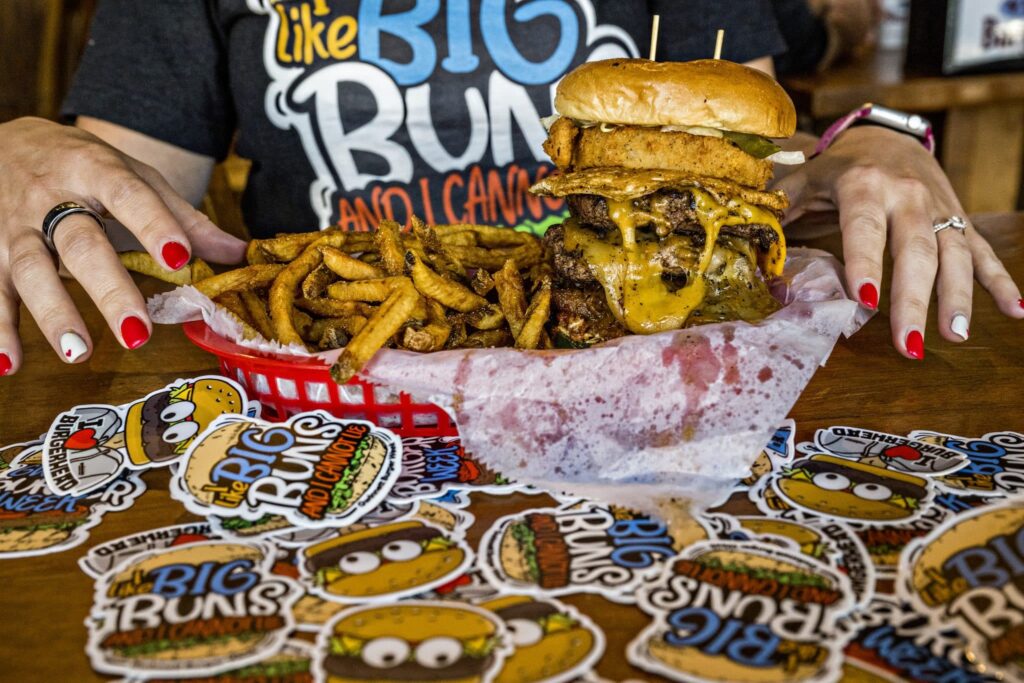
“We are proud to celebrate a decade of Gwinnett Burger Week and the incredible talent of some of our very best local chefs,” said Lisa Anders, chief operating officer of Explore Gwinnett.
“What started as a way to highlight locally owned eateries has grown into a beloved tradition, and we cannot wait for the community to see what we have in store for them this year!”
Throughout the week, each of 23 participating restaurants will feature an exclusive, off-menu burger.
Peachtree Corners highlights include:
- “The Alma” at Marlow’s Tavern — a perfectly seasoned and grilled burger with salsa verde, pepper jack, fried jalapenos, avocado, tortilla strips, lettuce, tomato and onion on a buttered sesame brioche bun.
- “The Blue Flame” at LOL Burger Bar — a 5 oz. premium beef patty topped with homemade macaroni and cheese, pulled pork, blue cheese crumbles and the restaurant’s secret sauce to add a bit of spice.
- “Fired Up Burger” at Firebirds Wood Fired Grill — a wood-grilled burger, lettuce, tomato, pepper jack cheese, jalapeno bacon jam, fried onions and tangy mayo topped with fried pickles garnish.
- “K-BBQ Burger” at Stäge — an Angus beef smash burger with Korean BBQ glaze, roasted cheese corn, house-pickled veggies and gochujang mayo on a sesame brioche bun.
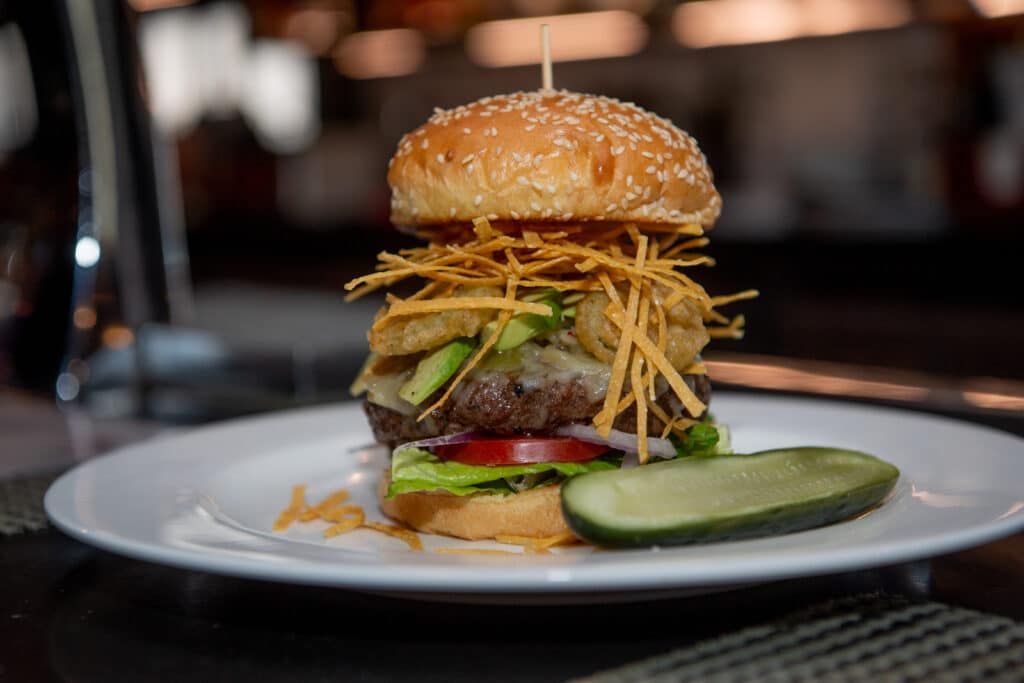
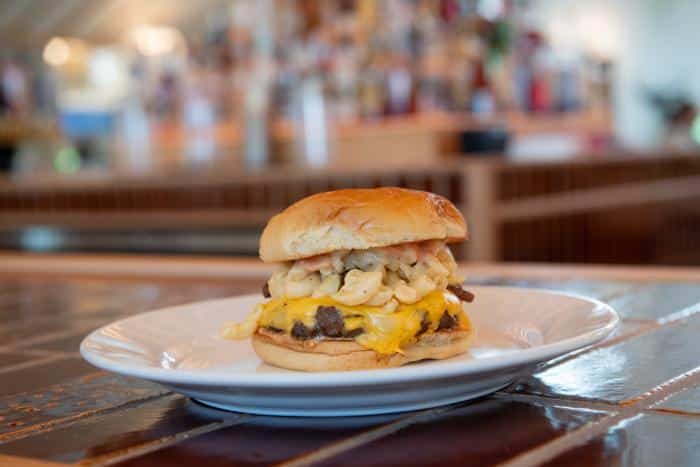
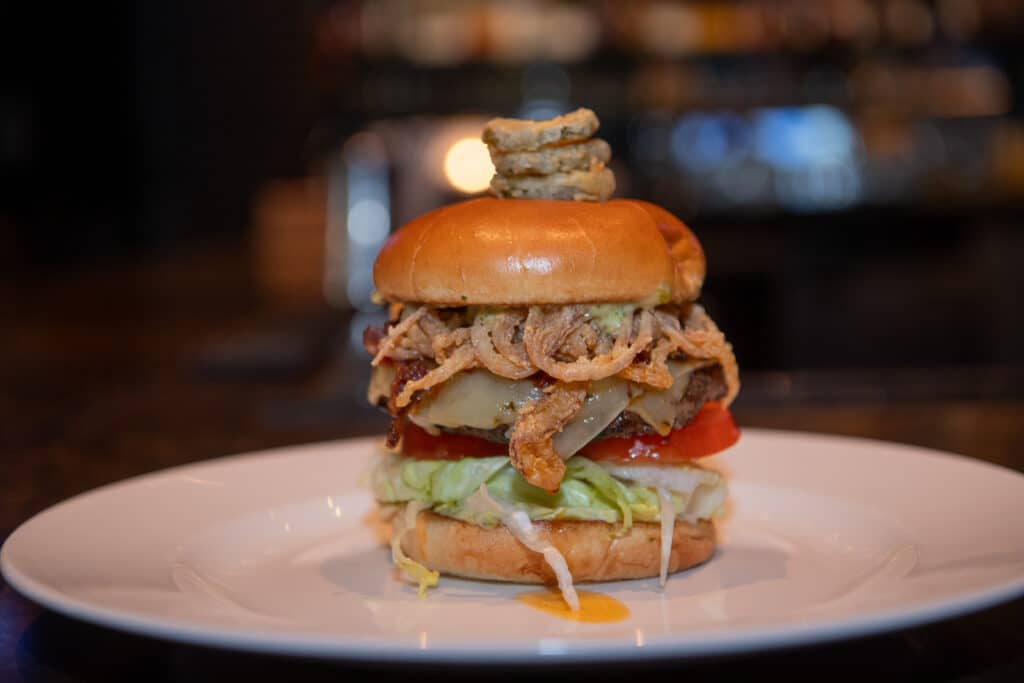
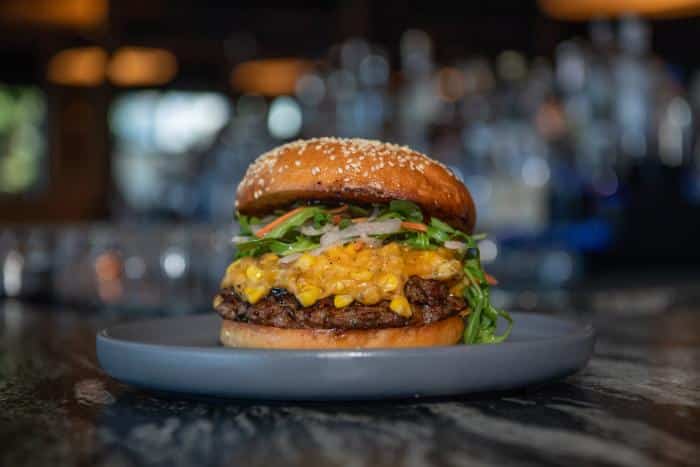
Gwinnett Burger Week digital pass
Back for its second year, the Gwinnett Burger Week Digital Pass encourages diners to check in at participating restaurants and earn points throughout the week, which are redeemable for prizes.
Each check-in is worth one point. Points can be redeemed for exclusive Gwinnett Burger Week merchandise from Explore Gwinnett, including restaurant gift cards, t-shirts, totes, sicker packs and a special edition 10th anniversary burger sticker designed by Lawrenceville-based artist Max Eve in celebration of this milestone.
Diners can also vote for their favorite burger by uploading an image of their receipt to the Gwinnett Burger Week website.
The Wall of Fame
Participants who track their dining experience at 10 or more restaurants throughout the week will be inducted into the Gwinnett Burger Week Wall of Fame with their photo published on Explore Gwinnett’s website.
“Our 10th anniversary milestone reflects the passion and creativity of Gwinnett County’s culinary community and the enthusiasm of all those who make this event a success year after year,” said Anders. “We can’t wait to indulge in the exclusive $10 burger creations ourselves, as we toast to 10 years of one of our favorite events!”
More details
To sign up for the Gwinnett Burger Week Pass, visit ExploreGwinnett.org/Gwinnett-Burger-Week/Burger-Week-Prize-Pass and provide the participant’s name, e-mail address and mobile phone number. A link will be sent to the participant’s phone, allowing them to access the pass and add the pass icon to their home screen.
For a full list of participating restaurants and limited-time burger offerings, visit exploregwinnett.org/gwinnett-burger-week.
Stay up-to-date on the latest Explore Gwinnett news by following @ExploreGwinnett on Instagram or ExploreGwinnett on Facebook. Diners are encouraged to share their experience on social media by using the hashtag #GwinnettBurgerWeek.
Related
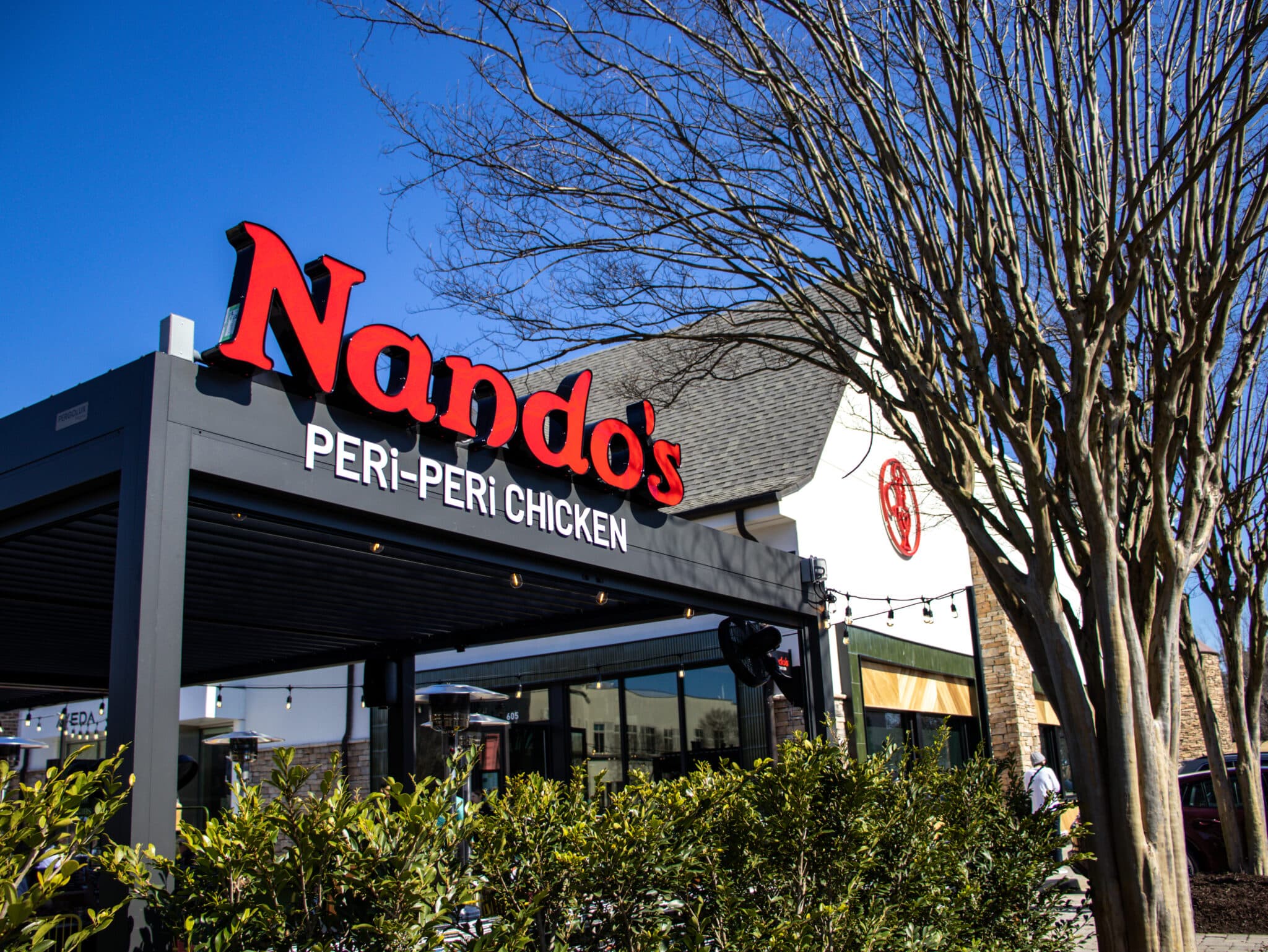
The South African fast-casual favorite expands in Georgia, bringing its signature flame-grilled spice and art-filled interiors to Peachtree Corners
Less than six months after opening its flagship Atlanta-area location at Perimeter’s High Street, world-famous South African restaurant brand Nando’s PERi-PERi opened its second Georgia restaurant to the public — for lunch and dinner service — on Tuesday, February 25.
Located within the premier mixed-used development and outdoor lifestyle center The Forum Peachtree Corners, Nando’s PERi-PERi is ready to offer its beloved flame-grilled chicken dishes, signature hot sauces and more to Atlanta-area locals and visitors alike.

“Atlanta has shown us so much love with the opening of our first location at High Street, so we couldn’t be more thrilled to expand our footprint in Georgia by bringing Nando’s to The Forum Peachtree Corners,” said Sepanta Bagherpour, chief brand officer at Nando’s PERi-PERi. “As a brand so rooted in community, we are excited to be a part of this lively hub where food, fun and connection unite.”
PERi-PERi flavor
Nando’s is known around the world for their flavorful flame-grilled chicken, and the concept’s popularity can be traced to PERi-PERi — or African Bird’s Eye Chili — the heart and soul of the Nando’s experience.
“We marinate our chicken in PERi-PERi for at least 24-hours, so the flavor goes right through to the bone,” Bagherpour explained. “Then we grill it over an open flame and baste it with PERi-PERi sauce to the customer’s preferred spice level. That’s what makes our chicken so addictive.”
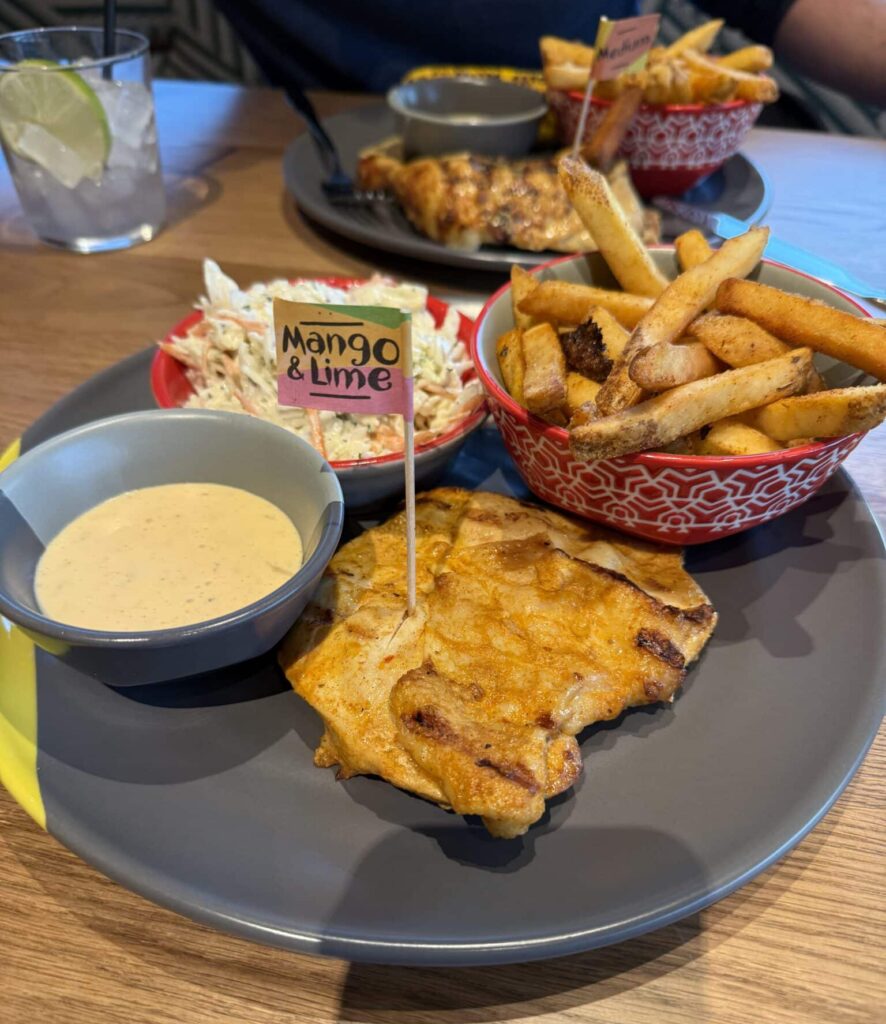
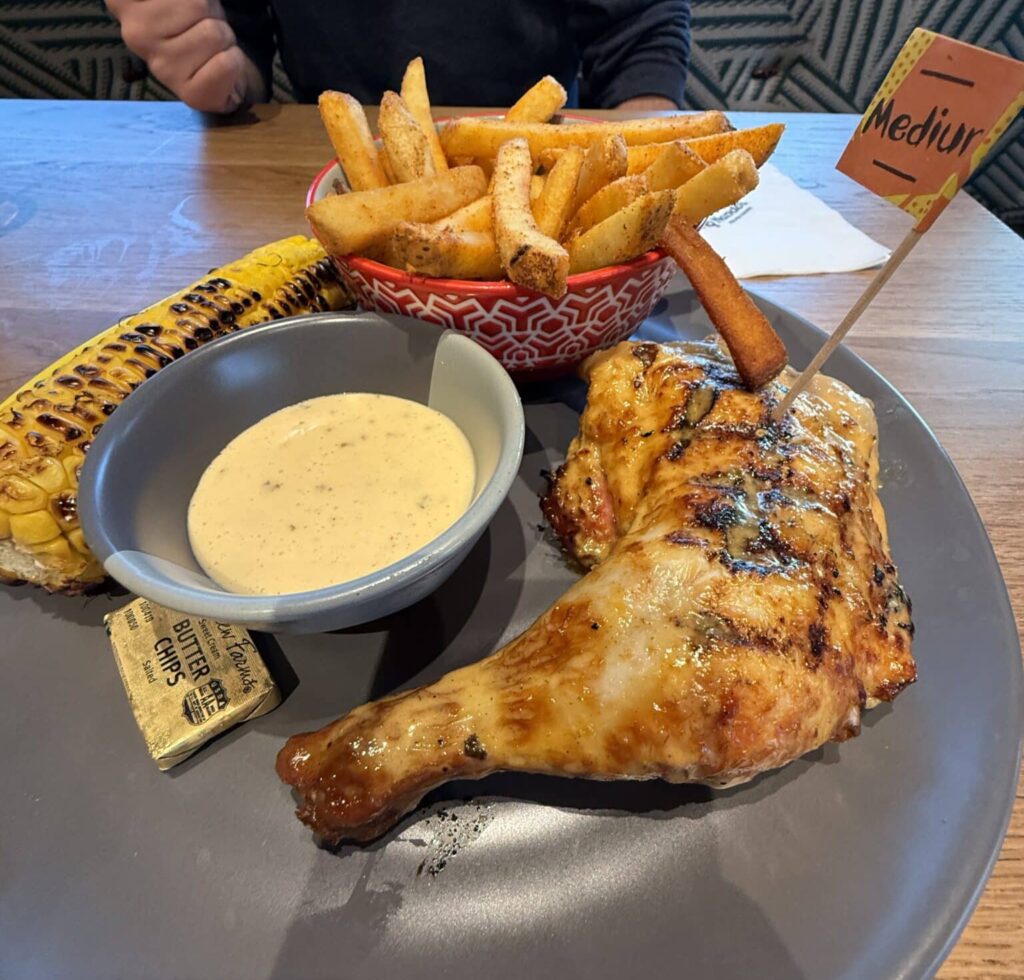
Nando’s sources its PERi-PERi in Mozambique, Zimbabwe, Malawi and South Africa via a network of 1,400 local farmers who are empowered with upfront access to funds, equipment and seedlings. And before the growing season even starts, they are guaranteed a fair price purchase commitment.
Warm space and friendly service
Nando’s intensely loyal following has not only been driven by its high-quality food, but also by its friendly service presented in a relaxed atmosphere that elevates the typical fine-fast casual experience.
Every Nando’s location is uniquely designed with earthy textures and vibrant colors that reflect its sunny African heritage while retaining a sense of place in which it lives and breathes.
The restaurant’s location in Peachtree Corners is no exception.
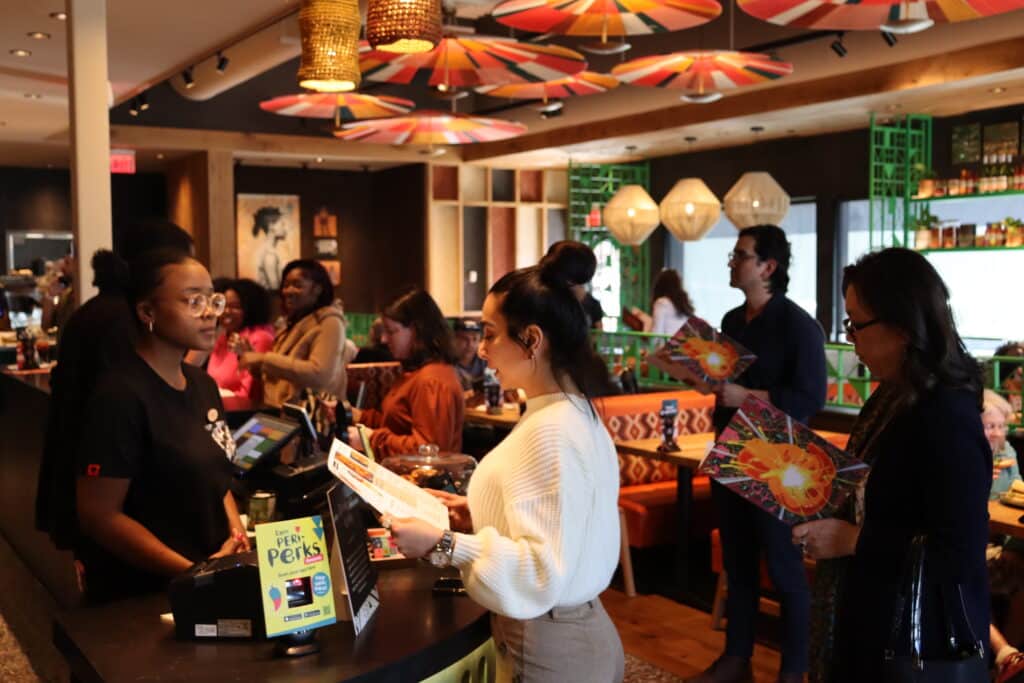
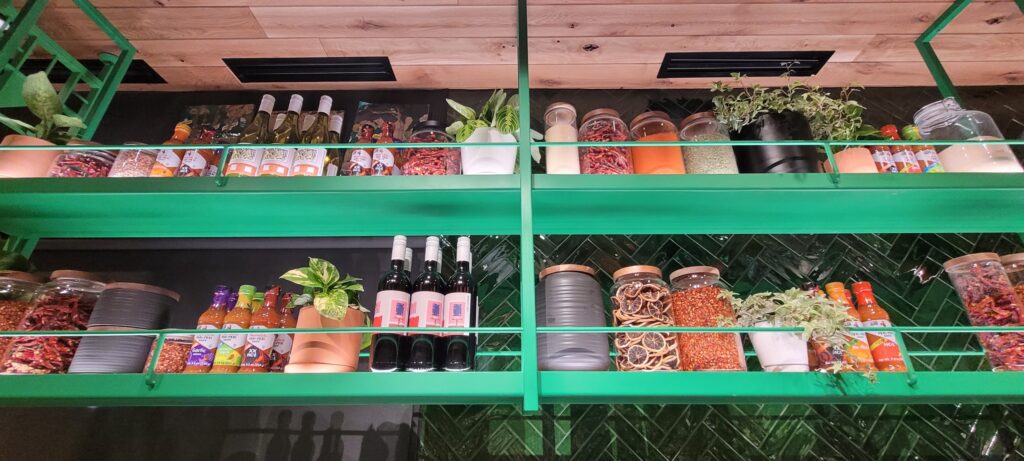

Designed by Fusion, Nando’s at The Forum is packed with custom lighting, furniture and authentic art imported from South Africa, showcasing the strong ties to its cultural heritage.
On a prominent corner within the newly refurbished open-air development, the new Nando’s visibility is boosted by its large, canopy-covered outdoor seating area. Inside the restaurant, guests will feel warm and welcome with design elements that balance the contrast of raw, textural finishes and saturated hits of color and pattern.
A great fit for The Forum
“As we continue energizing The Forum with new experiences for guests, Nando’s PERi-PERi stood out as an international favorite that would excite the community,” said Adam Schewgman, director and head of retail leasing at Jamestown. “From the inventive menu options to the meticulously selected design elements, we’re looking forward to giving visitors a taste of South Africa right here in Peachtree Corners.”
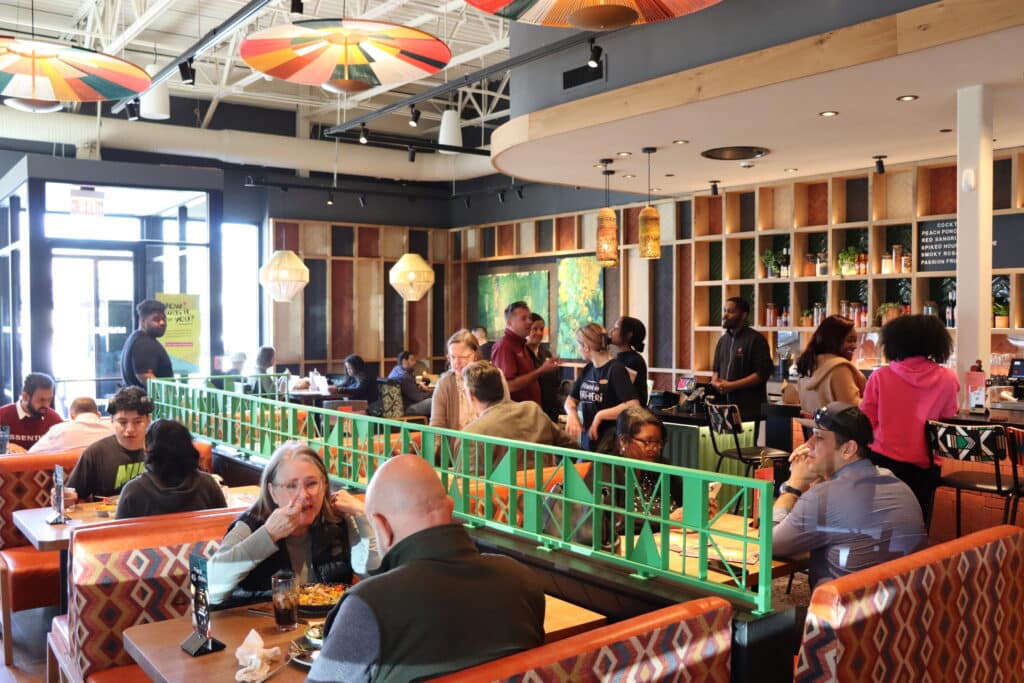
About Nando’s PERi-PERi
Since making its 1987 debut in Johannesburg, South Africa, Nando’s has spread its flame to legions of fans in 24 countries on five continents. The company entered the US market in 2008 with the opening of its first location in Washington, D.C., and now operates nearly 50 restaurants in and around Virginia, Maryland, Washington, Chicago, Texas and now Georgia.
For more information visit nandosperiperi.com or follow @nandosusa on Instagram.
Related
Food & Drink
Foodie Faves: Suburban Charm and Global Tastes in Peachtree Corners
Published
3 months agoon
February 25, 2025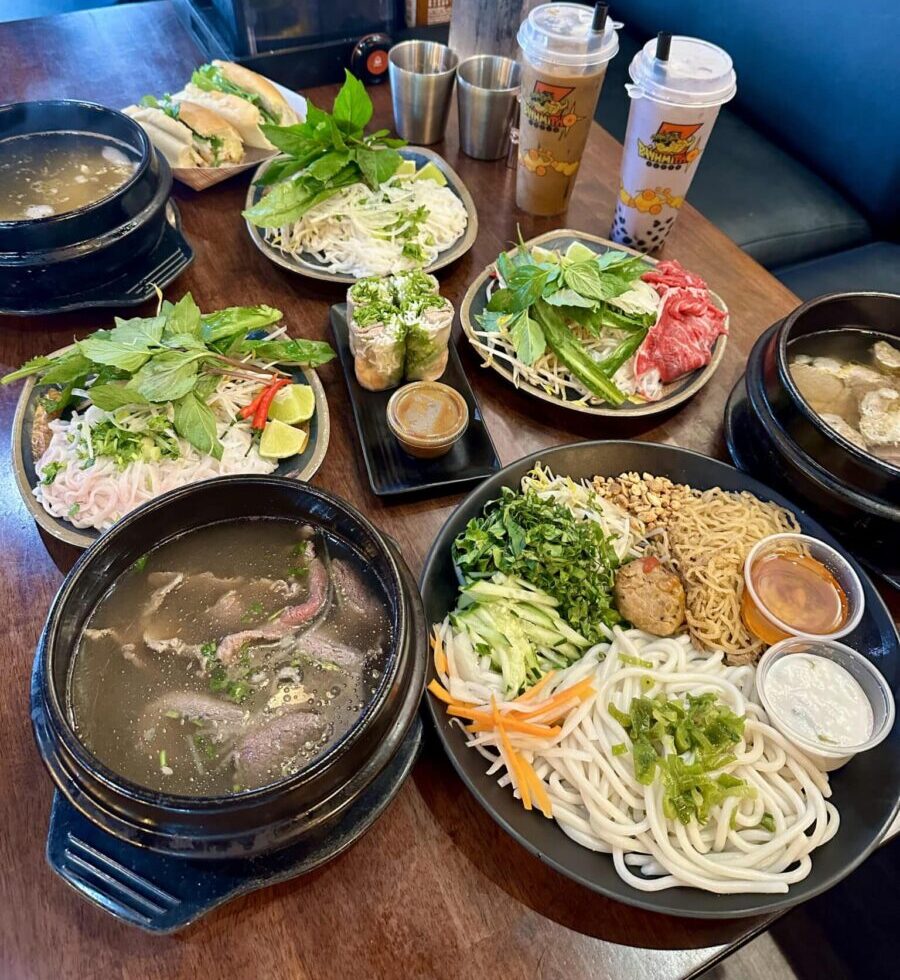
Metro Atlanta’s food scene is a tapestry of flavors, cultures and culinary creativity. Long known for its traditional Southern fare, recent years have also seen an increase in the number of restaurants — both independent and franchise — showcasing international, fusion or new South cuisines opening throughout the city.
While the busy food halls and trendy eateries in Midtown and Buckhead may get a lot of press, the northern suburbs, including Peachtree Corners, Norcross and Duluth, are experiencing a culinary Renaissance of their own.
Dozens of new and exciting restaurants have opened in Peachtree Corners over the last few years, with more planned for 2025.
Reflecting the eclectic tastes of a growing community, places like Stäge, H&W Steakhouse, and Fire & Stone Italian Pizza Kitchen have joined long-standing favorites such as J. Alexander’s and Taqueria del Mar in finding a following.
The upcoming scheduled openings of Golestan, Sei Ryu and the multi-restaurant lineup at The Forum’s new Politan Row has only added to the buzz around dining in Peachtree Corners.
With so many incredible places to choose from, figuring out where to enjoy your next lunch or dinner out can be a challenge. So, we turned to a few experts for help. And who knows the local food scene better than the influencers who get out, taste and share their thoughts on the latest and greatest spots in the city?
The following foodies answered the call to share some of their picks for must-try restaurants in Peachtree Corners and Norcross, with choices that offer something for just about every taste.
From Southern favorites to sushi, seafood, steak and more, these are a few of the local restaurants to check out — or revisit — in 2025.
Lena Ahn (@atlbestbites)

Dahlia’s Restaurant & Porch
One of Peachtree Corners newest restaurants, Dahlia’s Restaurant & Porch serves Southern American fare in the heart of the city. The setting is casual, and they often have live music in the evenings, which is a nice touch. They also have a beautiful patio, so be sure to dine outside when you can to truly enjoy the facilities.
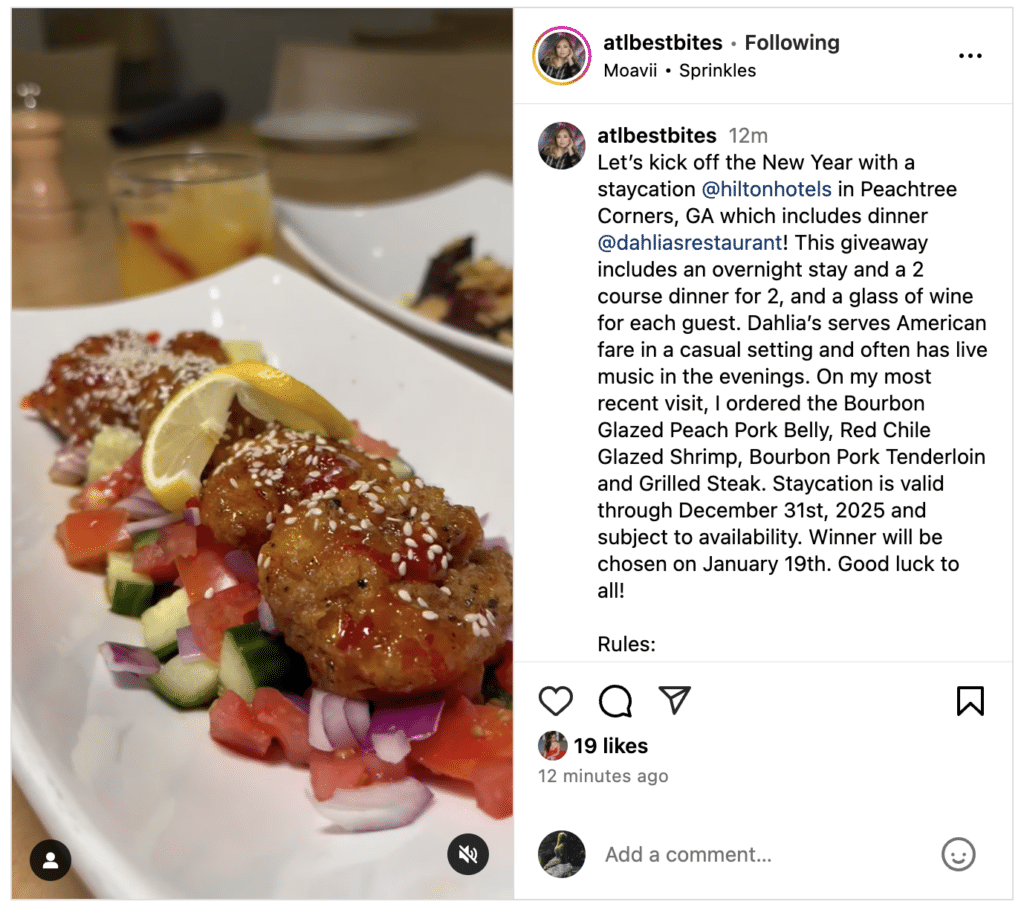
On my most recent visit, I ordered the Bourbon Glazed Peach Pork Belly, Grilled Steak, Red Chile Glazed Shrimp and Bourbon Pork Tenderloin. The shrimp was crispy and flavorful, and you can’t go wrong with steak!
Mai Le (@lemaitravel)

Stäge Kitchen & Bar
This was our third visit to Stäge Kitchen & Bar, and once again, it did not disappoint. The quality of the sushi here remains absolutely incredible. Every roll is fresh, flavorful and beautifully presented, showcasing the attention to detail that sets this place apart.
The consistency of the flavors and the impeccable service make it a standout spot. Whether you’re a sushi aficionado or just starting to explore Japanese cuisine, Stäge delivers an experience that keeps you coming back.
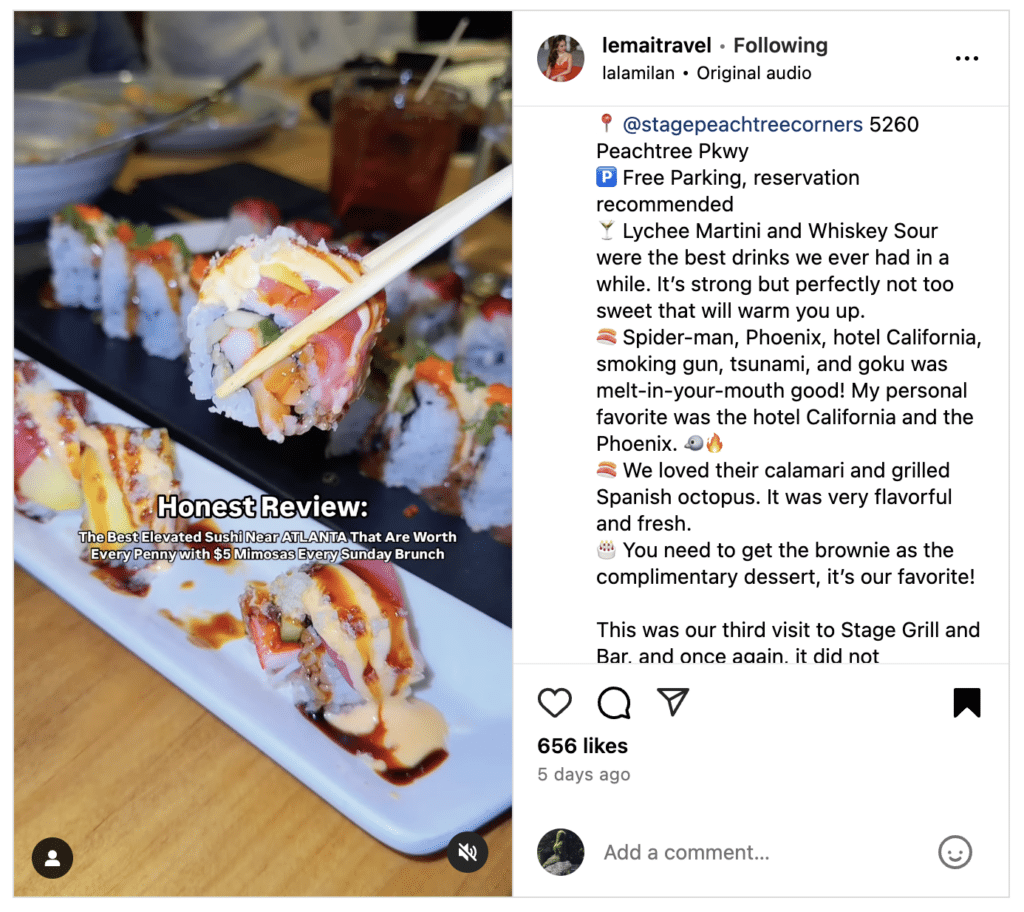
Highly recommend this gem for anyone seeking high-quality sushi in a welcoming atmosphere!
The Spider-man, Phoenix, Hotel California, Smoking Gun, Tsunami and Goku rolls were melt-in-your-mouth good! (My personal favorites were the Hotel California and the Phoenix.)
We loved their calamari and grilled Spanish octopus. Both were very flavorful and fresh.
The Lychee Martini and Whiskey Sour were the best drinks we’ve had in a while — strong but perfectly not-too-sweet that will warm you up.
And you need to get the brownie as the complimentary dessert; It’s our favorite!
Adam & Cole (@atlfoodiesofficial)

H&W Steakhouse
One of the BEST meals we had in 2023 and one of the best new restaurants we’ve dined at overall is hands down H&W Steakhouse in Peachtree Corners.
This stunning, fine-dining steakhouse is located 30 minutes outside of Atlanta and is one of the most beautiful restaurants we dined at [last] year.
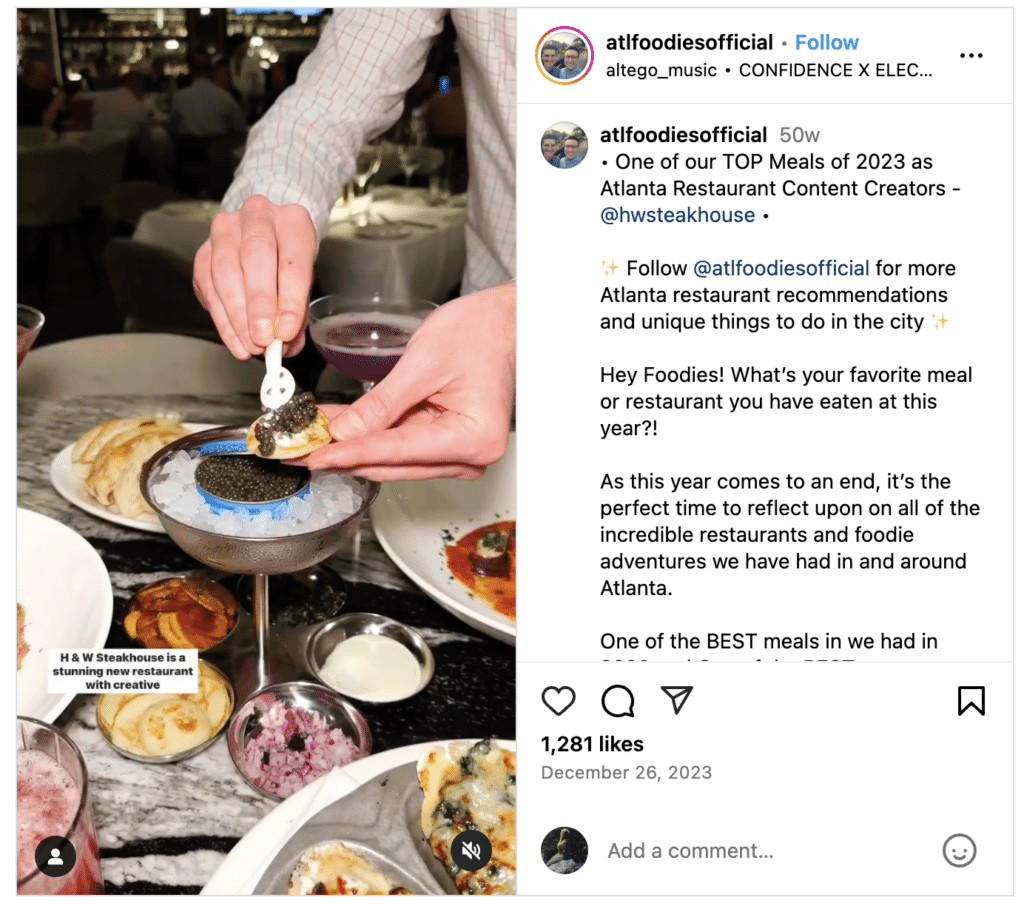
Serving everything from high-end steaks to luxury delicacies like caviar and A5 Japanese Wagyu, with over-the-top, tableside presentations, you will be absolutely blown away by your meal there.
You also have to end the meal with their famous Turtle Gelato Pie and Carajillo (a Spanish coffee cocktail made with espresso and liquor)! Both were absolutely phenomenal and a great way to end an amazing dinner.
Saadia Raja (@peachy_palate)

Pêche Modern Coastal
Good cheese needs good companions!
Our long overdue Girls’ Night Out led us to Pêche Modern Coastal where we had a cheesy good time.
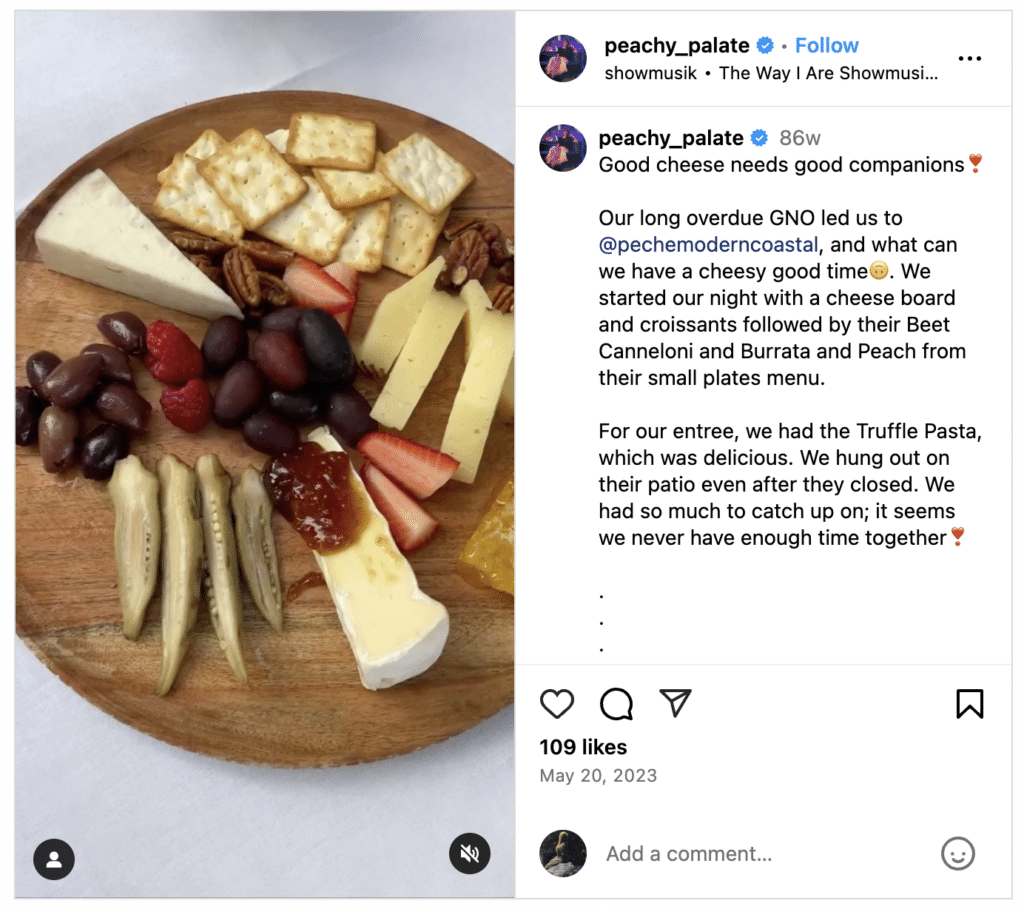
We started our night with a cheese board and croissants followed by the Beet Cannelloni and Burrata and Peach salad from their small plates menu.
For our entree, we had the Truffle Pasta, which was delicious.
I loved the patio at Pêche. We hung out [there] even after they closed. I can’t wait for spring and summer to come so I can enjoy it again.
Helen Dong (@_helenfoodie)

Super Banh Mi Pho
I finally got to try Super Banh Mi Pho, and I’m definitely coming back!
This Vietnamese restaurant has been on my list to try, and everything we got was so good! Some of my favorites are their banh mi and pho, which are made with fresh ingredients. The broth was so good, and adding in all the fresh ingredients made it taste even better!
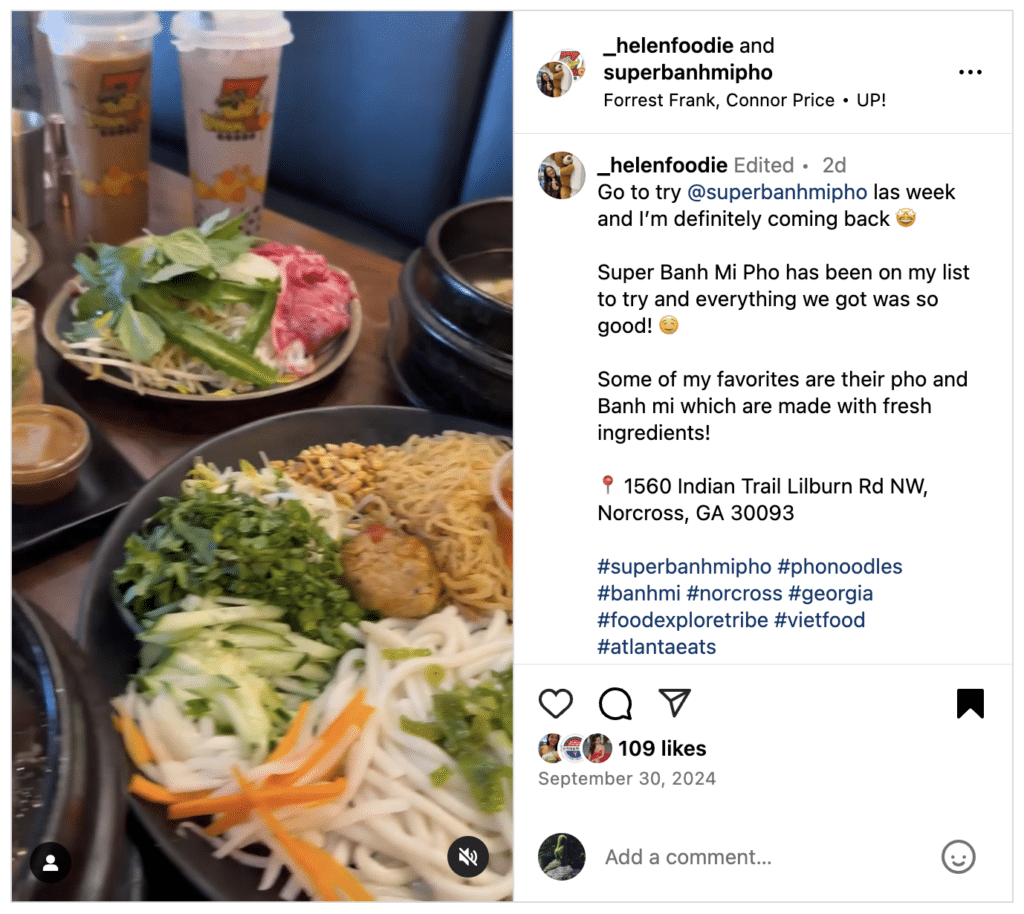
Editor’s note: Serving traditional Vietnamese dishes, the family-run Super Banh Mi Pho has developed a following among local foodies not just for its excellent food, but for its buzzworthy Dragon Ball Z décor, lively atmosphere and fun events.
This article originally ran in the February/March issue of Peachtree Corners Magazine. A digital edition of the publication can be found here.
Related
Read the Digital Edition
Subscribe
Keep Up With Peachtree Corners News
Join our mailing list to receive the latest news and updates from our team.
You have Successfully Subscribed!

From Boardrooms to the Himalayas: Vandana’s Journey to Purpose and Growing with Intention [Podcast]

Guardians of the Jukebox to Play the VoxStage on May 31

Brandon Branham Honored for Transformative Leadership in Peachtree Corners

Music Matters Productions Expands Peachtree Corners Headquarters

“Geek Culture” Shines at 2025 MomoCon

Celebration and Community: ICAGeorgia Wraps Up School Year with Two Festive Events

Vox-Pop-Uli Launches RED Initiative for Veterans’ Support

The PCBA Awards $500 to Light Up The Corners at After-Hours Event

Vox-Pop-Uli Launches RED Initiative for Veterans’ Support

The PCBA Awards $500 to Light Up The Corners at After-Hours Event

“Geek Culture” Shines at 2025 MomoCon

Celebration and Community: ICAGeorgia Wraps Up School Year with Two Festive Events

Guardians of the Jukebox to Play the VoxStage on May 31

Music Matters Productions Expands Peachtree Corners Headquarters

Brandon Branham Honored for Transformative Leadership in Peachtree Corners

From Boardrooms to the Himalayas: Vandana’s Journey to Purpose and Growing with Intention [Podcast]

Light up the Corners [Video]

Capitalist Sage: Business Leadership in Your Community [Podcast]

Cliff Bramble: A Culinary Adventure through Italy

Top 10 Brunch Places in Gwinnett County

A Hunger for Hospitality

THE CORNERS EPISODE 3 – BLAXICAN PART 1

Top 10 Indoor Things To Do This Winter

The ED Hour: What it takes to Remove Barriers from Education








